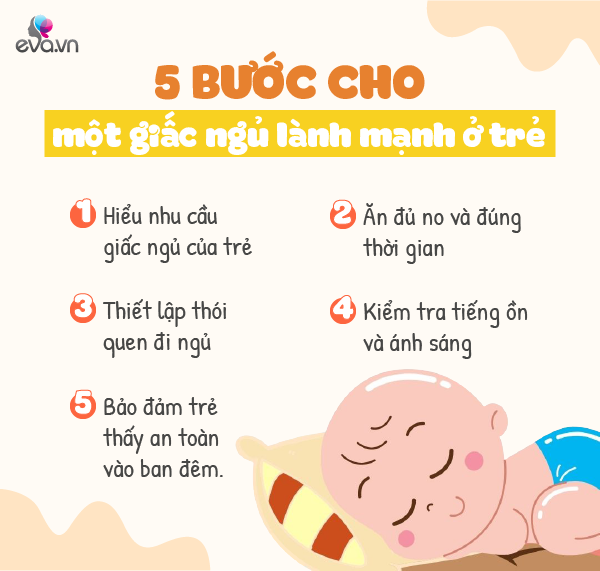Usually, babies’ sleep does not follow a specific schedule, even many babies often sleep more during the day and are constantly awake and crying at night.
Most babies don’t sleep consistently for 6 to 8 hours a night until they’re 3 months old, and in some cases, they’ll stay up all night until they’re 1 year old. This leaves many parents anxious and exhausted.
Coaxing a child to sleep is not only a work of strength but also a skill that requires patience, so parents need to understand the child’s sleep problem, in order to have better care methods.

Sleep problems that young children are likely to encounter, parents should pay attention to
If parents understand some of the main sleep problems in their children, it will be more helpful for parents to care for and benefit their children.
Baby in reverse day and night
Many children fall into the state of being awake at night, sleeping during the day, having difficulty falling asleep and being irritable before going to sleep is a concern of many parents with young children. The more children stay up late, the less they have the opportunity to develop in height and brain.
In general, this condition can stem from a child not clearly recognizing the difference between day and night, resulting in a child being less active during the day and more active at night.
If the child is often in this state, the mother should increase the play activities and practice for the child more, so that the child can switch from simple movements to complex movements, slowly adjust the level accordingly. .

Most babies don’t sleep seamlessly for 6 to 8 hours a night until they’re 3 months old.
Drowsy and crying, but not sleeping
This condition often occurs in infants and young children after 2 months of age, it is clear that the baby is very sleepy, even showing signs of crying, but no matter how much the mother comforts, the baby still refuses to sleep.
The reason is that the child is too young to fall asleep on his own, if the mother does not have time to coax the child to sleep when the child is sleepy, it will make the child toss and turn, eventually crying and irritable.
In this case, parents should learn to observe the baby’s state, if there is a state of yawning, rubbing his eyes, or lack of activity, it means that the baby is asleep, then the mother should coax the baby to sleep as soon as possible.
Poor quality of sleep, frequent awakenings
Some babies and young children have poor sleep quality, every time they fall asleep, they wake up about half an hour later, even moving around.
The fact that the baby is in this state does not mean that the baby is awake, because the quality of sleep is poor, it may be that the baby is in a light sleep state.
Newborns and children under 3 months are usually in a light sleep state for 20-30 minutes after falling asleep, at this time the mother can gently rub her back with her hands, the baby will soon calm down.
In fact, there are many ways to solve the problem of sleeping problems of babies and young children, just by observing carefully, they can find a solution and overcome this situation in time.

Many babies sleep more during the day and are constantly awake and fussy at night.

Steps for a healthy sleep in children
The reason why children do not get a good night’s sleep is mostly because parents have not established scientific sleep habits, causing the baby’s activities to not follow a consistent schedule, or because the baby has been sleeping too long. much during the day.
Parents can apply some of the following steps to improve their children’s healthy sleep.

Understanding your baby’s sleep needs
Children’s needs and sleep patterns are different at different ages. For example, as a child grows older, he or she will begin to sleep less during the day and more at night, and the amount of time the child sleeps will also shorten. So children of all ages need the sleep they need to be able to play, learn and focus during the day.
Through each stage, infant sleep changes as follows
Babies 1 week-2 months old
In the first week after birth, babies can sleep up to 18-20 hours a day at most and sleep at any time of the day, each sleep can last from 30 minutes to 3, 4 hours . On average, babies under 2 months of age can sleep 16-18 hours a day.
Children 3-6 months old
From 3 months of age, a baby’s sleep changes, they can sleep longer and sleep on demand. On average, children can sleep from 14-16 hours a day, in which, daytime sleep can be from 3.5-5.5 hours and night sleep lasts from 9.5-11.5 hours.
Children 6-12 months old
Children’s sleep at this stage has changed a lot, babies can sleep according to their needs, bedtime and circadian rhythms of children may already be formed and similar to adults. On average, children can sleep 14 hours a day, of which, daytime naps are reduced to -2 sleeps.
Children from 1-5 years old
After 1.5 years of age, children’s sleep has changed a lot and is almost completely similar to adults. On average, children aged 1-5 can sleep 10-12 hours a day.

Parents should understand that children’s needs and sleep patterns are different at different ages.
Eat just enough, not too full
Parents should ensure that children have a full dinner at a reasonable time. Feeling too hungry or too full before bed can make a child more alert or uncomfortable.
This can make it harder for your baby to fall asleep. In the morning, a healthy breakfast will help kickstart your child’s biological clock at the right time.
Create a bedtime routine
Getting your child into the habit of doing the same relaxing things in the same order and at the same time each night will help promote a good night’s sleep.
For example, giving your baby a warm bath will help your child relax and get ready for sleep. Keep the lights dim in the sleep space to stimulate your child’s body to produce the sleep hormone – melatonin.
Once your child is in bed, encourage them to read silently or listen to some relaxing music or tell a story to them, in a low, even voice.
For older children, the routine might include a quiet conversation with a friend about the day and then relaxing alone before turning off the lights. Even older children may enjoy relaxing by reading or listening to books. Music or relaxing breathing exercises.
Noise and light test
A private, quiet space with limited light is very important for a good night’s sleep, mothers should pay attention to adjust the light not too bright, the space is quiet, well ventilated and neat.
Mothers should be aware, blue light from televisions, computer screens, phones and tablets can reduce melatonin secretion and delay sleep. Parents should turn these off at least an hour before bed or keep screens out of your child’s room at night.

Try to create a private, quiet space with limited light that is important for a good night’s sleep.
Make sure your child feels safe at night
Many young children will feel scared or anxious in the dark, so parents should pay attention to make sure their children feel safe at night.
If your child is really scared about going to bed, you can praise and reward him whenever he’s brave.
At the same time, minimize horror TV shows, movies and video games, and instead let your baby listen to soft music and play light games such as wooden puzzles, puzzles. Some children who are scared to bed may feel better with a night light on.
at Blogtuan.info – Source: Eva.vn – Read the original article here





